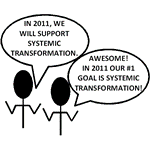 In 2005, when I was working at Mellon, a fellow funder suggested that the funding community needed to stop using words like ‘strategy’. She lamented, “Funders got arts organizations to start using [such] business words years ago, but nothing has changed. They are not in better shape.†(Evidently, it takes more than using business jargon in funding guidelines and proposals for arts organizations to improve their finances.) Around that same time I correctly predicted that ‘innovation’ would emerge as the next funder mot-du-jour.
In 2005, when I was working at Mellon, a fellow funder suggested that the funding community needed to stop using words like ‘strategy’. She lamented, “Funders got arts organizations to start using [such] business words years ago, but nothing has changed. They are not in better shape.†(Evidently, it takes more than using business jargon in funding guidelines and proposals for arts organizations to improve their finances.) Around that same time I correctly predicted that ‘innovation’ would emerge as the next funder mot-du-jour.
Funnily enough, I was at a meeting of funders a year later at which some had recently jumped on the ‘innovation’ bandwagon while others, who had been using ‘innovation’ for a year or two already, were planning to take the word out of their guidelines because they had determined it wasn’t working. (Evidently it takes more than using business jargon in funding guidelines and proposals for arts organizations to overcome risk aversion and ‘innovate’.)
‘Systemic’, ‘effective’, ‘sustainable‘, ‘adaptable’, ‘entrepreneurial’, ‘accountable’, and ‘artistically vibrant’ now appear to be vying for top spots. ‘Emerging’, ‘mid-career’, and ‘established’ are continually embraced and abandoned like partners in a square dance (and many artists and organizations cleverly reposition themselves accordingly in order to qualify for grants). Of course, these buzzwords never fully displace the ubiquitous pursuits of ‘excellence’, ‘accessibility’, and ‘diversity’.
This juggling of magic words and continual tweaking or overhauling of definitions and priorities by many (but certainly not all) funders is understandably maddening to grantees. Funders intend no harm, and most probably believe their ideas and guidelines are well-received because … well, who would dare to say otherwise? The generally accepted wisdom is that it’s safer to flatter funders than to challenge their intelligence. Even when funders convene arts leaders to ask for ‘honest input’ that might help shape their priorities and guidelines, all too often participants leave the meeting shaking their heads at the amount of BS flung around the table.
Fantasizing for a moment … I wonder what would happen if funders started getting letters from organizations saying: “After reviewing your guidelines we have determined not to seek a grant in support of ‘Systegic Survibrustainadaptinnovaccountabeffectipreneurism‘. We must admit that we understand neither what is meant by this term as you are using it in your guidelines, nor why you believe it to be an appropriate, beneficial, or achievable goal for our organization or others like us. We considered writing a fictional proposal that would please you, because we could certainly use the funds in pursuit of the goals we’re actually pursuing, but decided this would be both disingenuous and a waste of time (yours and ours).â€Â
I suspect most funders would shrug off such a letter and that it would have little impact.
David Dower at Arena Stage has noted at more than one gathering of theater types that being “an ‘artist-focused‘ organization that develops ‘new works‘ by ‘emerging’ artists‘ of ‘culturally diverse‘ backgrounds,†is the current phrase that pays with theater funders. As you might suspect, it has become an articulated goal (if not a goal in practice) of theaters across the US. I’ve witnessed funders and theater leaders alike chuckling at David’s observation, no doubt in sheepish recognition of its truth.
The promotion of such jargon by funders, and the dutiful adoption of it (on paper anyway) by arts organizations has been going on for decades. What’s bewildering and disappointing is that this mechanical and dysfunctional pas-de-deux persists despite the fact that both grant-makers and -seekers seem to recognize it as such. I wonder whether we have simply given up on the possibility of enlightened dialogue, or whether we are we actively trying to avoid it?
So … any predictions on what the winning word for 2011 will be?
